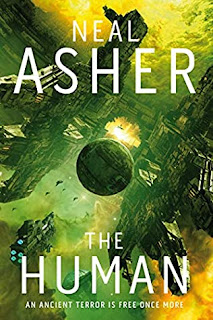 |
| Steady as she goes |
Not a quiet month for reading, but nicely split between gaming and fiction. I do have a couple of zines that should be in the numbers above (see earlier reviews), but I need to add them to Goodreads first.
A Fragile Thing (Kevin Wignall)
The protagonist of 'A Fragile Thing' should be dislikable, but I found myself warming to him. An amoral money man, Max invests on behalf of people who do bad things. It's cost him relationships with lovers and family, but he's rich and respected in his circles and makes point of never breaking the law. Except that one time he sailed very close to the wind. The story follows the death of his parents, and the family repercussions, which coincide with the FBI starting to focus on his affairs to use him to get to his clients. I was surprised how much I was engaged by this. Of course, the story follows Wignall's fast paced style and draws you through. Enjoyable. |
| Events start small... |
The Soldier (Neal Asher)
Jain tech has been a recurring menace throughout the Polity books; initially, it will usually appear benign, granting the user access to technology better than that seen in known space. All the while, it is learning about the user, and eventually, it will sequester and subsume them. It is believed that the technology consumed the Jain civilisation and that outbreaks destroyed several other civilisations. It is the kind of technology that will cause governments to destroy worlds with planet-busters to prevent its spread, and trade in artefacts is heavily controlled lest something escape. The disk is also a link to Jain AIs, sitting somewhere in U-Space, believed to have escaped the collapse of their culture.
Orlandine is aided by the Dragon, an enigmatic and massive bio-mech probe deployed by one of the lost civilisations. Dragon has also been a recurring theme in the series, and presently seems focused on trying to understand what is going on in the accretion disk.
Adding to the mix are survivors from the renegade AI Erebus' rebellion and attack on the Polity, and Earth Central Agents acting to investigate.
After all this setup, Asher lights the touchpaper and the story takes us to a place where some Jain tech is released, causing carnage and initiating an event that could change the future of the Polity and the Prador. It's fast-paced, energetic and fun, twisting and turning as it moves along relentlessly towards the reemergence of the Jain after millions of years of dormancy.
 |
| It starts to go a bit EE Doc Smith |
The Warship (Neal Asher)
In the second part of the Rise of the Jain, it alls starts to go a bit EE Doc Smith in the kinds of weapons being deployed. Orlandine has been forced to use her final solution to counter the Jain threat that emerged in the previous book; however, both Earth Central and Dragon are convinced that she has been tricked into doing something that the Jain AIs wanted. Meanwhile, insurgents are planning to murder Orlandine when an opportunity presents and she is in human time, mostly disconnected from her AI support systems. Tensions rise between the Prador Kingdom and Earth Central as they prepare fleets to take action if a Jain Incursion occurs.
Adding to the mix is the Client, an alien creature from a race the Prador exterminated. The client specialised in weapons design, working with the Polity against the Prador, and had been killed. Its resurrection was manipulated in the first book, and it stole one of Orlandine's massive space defence platforms. Now it's back, seeking to rescue the last survivors of its race who are hidden deep withing the accretion disc now being consumed by the black hole dropped within it.
As the black hole approaches the protostar, it soon becomes clear that something is wrong, and that the physics isn't working as expected...
Enjoyable, accelerating fun, but ultimately the mid-point of the trilogy so slightly less satisfying than the first and last. However, the momentum continues to build and the parts in play continue to shift. Good stuff.
 |
| An ancient threat emerges, and an unexpected saviour. |
The Human (Neal Asher)
So this is where it gets real. The impact of the black hole on the accretion disc in the previous book destabilised the U-Space technology that had kept a Jain Warship and a Species Warship trapped for five million years. Humanity and the Prador are forced into an existential fight with the Jain, knowing that if they break free then it probably means the end of both civilisations. Both sides are forced to reveal previously wild card technology, but is it enough.
Orlandine, initially assumed dead after the assassination attempt in the previous book, is forced to take a very dangerous path to defend the planet she rules, allowing the Jain technology she has absorbed and controlled to grow to its full potential, perhaps putting what is left of her humanity at risk.
Meanwhile, the Client tries to retrieve its people and an ECS team rendezvous with it, necessary allies. The significance of both the team being Hoopers from Spatterjay is revealed, and one of them will take a key role in defending against the Warship.
The story comes to a great conclusion, with hooks for further adventures, and reveals much about the back history of the setting. Recommended.
--
This is the second Asher trilogy that I've read back to back; I certainly recommend doing them like this, as it's a lot more satisfying.
5 April 2021

No comments:
Post a Comment